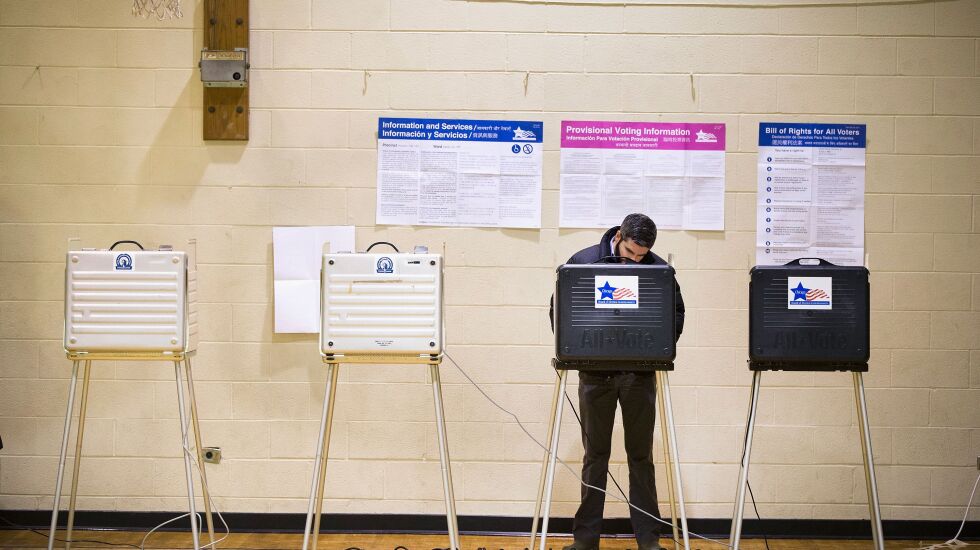
Determined to attract a more diverse City Council in tune with the needs of working people, a Northwest Side alderperson is resurrecting the idea of public funding for Chicago elections.
Ald. Matt Martin (47th) is well aware that the idea of publicly funded elections has been floated before and gone nowhere, including an effort by his forward-thinking predecessor, Ameya Pawar.
But Martin said public sentiment has changed in the seven years since Pawar joined former alderperson-turned-Cook County Clerk David Orr in proposing the idea.
“There’s a real hunger to support folks who are not super-wealthy and well-connected, but very much in tune with working-class individuals with the struggles that middle-class individuals are facing. There’s a real desire to see a change in how elections are financed so it’s easier for folks who fall into those groups to run,” Martin told the Chicago Sun-Times.
Martin noted publicly funded elections in New York City helped that city “expand the diversity” of its City Council “in more ways than one.”
“Now’s the right time to get their conversation going — especially before we get into the heart of the election cycle — so that we can engage members of the public, engage colleagues on City Council so this is part of the conversation during the elections and, hopefully, really builds up momentum so this is something we can pass as quickly as possible, but likely early in the next term,” Martin said.
Ken Griffin, Illinois’ richest man and soon-to-be Florida’s richest man, tried and failed to hand-pick Gov. J.B. Pritzker’s Republican opponent by contributing an unprecedented $50 million to the gubernatorial campaign of Aurora Mayor Richard Irvin.
That amounted to $418 for each of the 117,514 votes for Irvin, who finished an embarrassing third behind Republican gubernatorial nominee Darren Bailey and Jesse Sullivan, the runner-up for the GOP nomination.
Pritzker, the billionaire incumbent and heir to the Hyatt Hotel fortune, spent $30 million to meddle in the GOP primary to boost Bailey, whom he viewed as his weakest possible opponent this fall.
There also was an earlier big-bucks battle of billionaires, with Griffin defeating Pritzker’s proposed constitutional amendment that would have authorized a graduated income tax.
With those battles and the parade of recent corruption investigations and convictions fresh in the minds of voters, Martin believes voter sentiment has turned in favor of publicly funded elections in Chicago.
His ordinance, introduced at the last City Council meeting before the traditional August recess, is patterned after Pawar’s earlier version.
It calls for a 6-to-1 public match, totaling up to $3.6 million for mayoral candidates, $180,000 for candidates for city clerk and city treasurer and $150,000 for aldermanic candidates.
To qualify for those matching funds, mayoral candidates would be required to raise “no less than” $200,000 in “matchable contributions” of no more than $175 apiece from 1,145 Chicago residents.
Candidates for city clerk and city treasurer would need to raise at least $175,000 from at least 100 contributors, each with the same $175 limit.
The minimum for candidates for alderperson would be $17,500 raised from at least 100 contributors. Sixty of the first 100 donors of no more than $175 would need to live in the ward. The remaining 40 donors could live outside the ward, as long as they still live in Chicago.
All qualifying contributions would have to be received no earlier than six months before an election and no later than 90 days after voters go to the polls.
The ordinance says nothing about the source of the public funding.
It simply states a seven-member “Fair Elections Board” would police the ordinance after developing a searchable database of contributions and expenditures by qualifying candidates — a database that is “accessible to the public.”
Board terms would be staggered in length. The mayor, inspector general and City Council would each make two appointments. The seventh member would be appointed by the Chicago Board of Election Commissioners.
“When this was first introduced, our finances were far from stellar. But as we’re working to climb the pension ramp in a more significant way and as federal [stimulus] fund fall out, that’s something we really want to [consider] and see what different ideas folks have” for finding the money to bankroll publicly funded elections, Martin said.
“But if we can have a situation where folks in elected office ... are spending more and more of their time focused exclusively on official business and not having to fundraise so much as a means to an end, the outcomes on a whole host of issues are gonna be better.”







